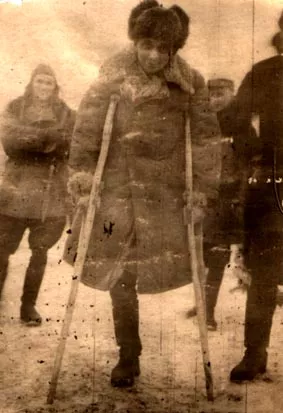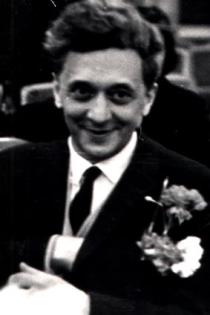Albert Tsessarskiy
This is me in late 1944 being wounded on my way to the hospital in Moscow. These are the crutches, which helped me to get better. Now they are in the Museum of the Partisan Movement in Saint Petersburg.
I remember the outbreak of war. I was on my way to the hostel from my sister's place. I saw window wide open and listening to Molotov's speech when I was in the street: "War". I dashed to the hostel, where military enlistment office was located. I came to the office I was indicated. I was included in the USSR NKVD squad of special purpose. People from that squad were included in reconnaissance and diverstion partisan groups and squads. That was the way my military life had started.
The squad, where I started my army service was called "Separate motorized rifle squad of the special purpose squad". First, our squad did not study. I was assigned as a doctor there. I was conferred the title of doctor of the 3rd rank, i.e. captain. All of us were clad in military uniforms. We joined the acting army and moved towards the west. Then I found out that in January 1942 the group under commandment of the Hero of the Soviet Union Dmitriy Medvedev came back from the rear of the enemy. Medvedev was the leader of the partisan movement in Bryansk oblast, Western Ukraine and many other parts of USSR, occupied by Germans. My fellow student Alexander Feinstein was with them. He told me everything and took me with Medvedev, He managed to get me transferred to his squad, which was being formed at that time.
Squads were formed from volunteers. When the squad had been formed we started training. Nobody knew anything about the forest life, how to walk in azimuth Medvedev taught us that. In May 1942 our first group came to the rear of Germans.
We had a lot of battles and we had to take all our wounded with us. We acted in Rovno, Lvov [about 1000 km to the south-west from Moscow], Lutsk and Vinnitsa. We had a mobile hospital. For the first year and a half I was the only doctor in the squad. There were two more medical assistants. Then Vera Davydova, who studied in our institute, was sent to the squad. Local doctors also came to help. Finally there were 10 doctors. Our squad grew. There were about 3000 men.
We had been in more than 80 battles for 2 years. We had not lost a single battle, but we had a lot of casualties. Everybody participated in the battles. The cook took a rifle and started shooting. The sanitary unit was also involved in battles, though in accordance with the international convention medicals were not supposed to fight. There was no other way-out.
I had another function in the camp- make forged papers and documents for our reconnoiterers. I was the one only who knew how to type on the typing machine with the German font, but it was of paramount importance for the leading reconnoiterer Kuznetsov to get the documents. He was not involved in processing of the forged documents. I was the one who was doing it. Those documents worked out OK and there was a certainty that things went smooth. I typed on the trophy German typing machine. There were cases, when I had to go to Kuznetsov for a secret meeting to update his traveling documents.
For the entire period 8 stooges were sent to us. Six out of them were divulged and one of them managed to escape and bring the punitive to us. Germans decided to do away with us. It was a hard battle and we managed to win it in the end. We took 80 carts with ammunition, provision and three cannons.
I was severely wounded in late 1944. I had a splintery fracture of ankle joint. Then a truck was sent from Moscow and I went there by truck. I was rendered first aid in the hospital. I came back to my wife from the hospital. We lived in the hostel. It took me a long time to walk on the crutches and I met the victory day on crutches as well. Everybody was crying: "Victory!"
















